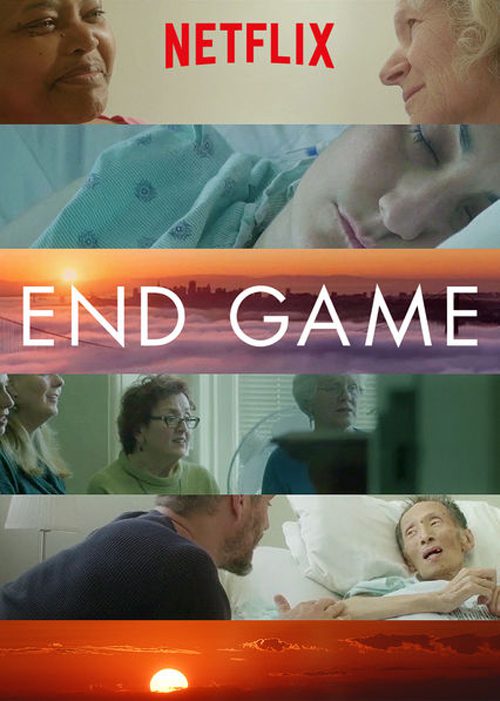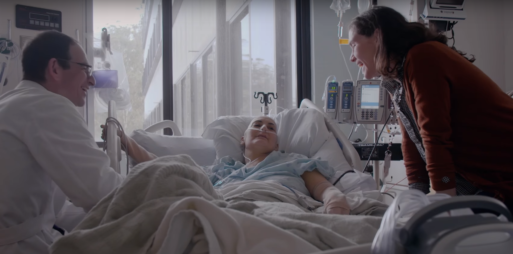 Two years ago, Netflix tested the boundaries of conventional entertainment and released the short documentary, Extremis, a movie about the difficult decisions patients and families face as a life slips away. The movie chronicled the journeys of two families whose loved ones were terminally ill, giving viewers a small window into what it means to be facing certain death. Now, the streaming video service has given us a second documentary in the same genre — “End Game.” And it’s just as gripping and heartrending as the first.
Two years ago, Netflix tested the boundaries of conventional entertainment and released the short documentary, Extremis, a movie about the difficult decisions patients and families face as a life slips away. The movie chronicled the journeys of two families whose loved ones were terminally ill, giving viewers a small window into what it means to be facing certain death. Now, the streaming video service has given us a second documentary in the same genre — “End Game.” And it’s just as gripping and heartrending as the first.
“End Game” is a 40-minute documentary from award-winning directors Rob Epstein and Jeffrey Friedman that follows a group of palliative care physicians who care for the dying with compassion, honesty and respect. Set in two locations in the San Francisco Bay area, the film is an intimate and often heartrending study in what it’s like to die.
At the beginning of the film we meet Mira, a 45-year-old Iranian-born woman who is clearly dying of cancer. She is in and out of consciousness, but we get the sense that she is still very connected to the things that define her life — her sense of humor, her dignity and the family she adores. Mira seems determined to stay alive, and her family clings to the hope that her condition can improve. But Mira is quite obviously doing very poorly. Even though she rallies when her sister arrives from Switzerland, we sense that her life is slipping away.
And then there’s Pat, a middle-aged woman who was recently diagnosed with uterine cancer that is, she says, “incurable.” As she speaks of her diagnosis, shock and pain are clearly etched on her face. But as she talks to a palliative care volunteer, she surprises us by proclaiming through her tears, “I’m doing good; I’m doing good.”
Later, we watch as Pat talks to two nurses on the palliative care team about the possibility of receiving chemo. The idea obviously frightens her, yet she is willing to endure it if it gives her even one more day. “Each day is a gift,” she says.

Dr. Pantilat and a nurse speak with Mira in her hospital room
We also meet two amazing physicians, Dr. Steven Pantilat, the director of the palliative care program at UCSF Medical Center, and Dr. B.J. Miller, who, in addition to seeing patients at UCSF, is the director of the Zen Hospice Project, a 6-bed inpatient hospice in San Francisco that provides end of life care. Both men are amazingly skilled and amazingly frank, even as they talk to their patients and their families about the inevitable end. But that honesty is key, says Miller — the ability to face suffering and not look away — is the “muscle” one needs to do this kind of work.
And Miller has certainly had a lot of practice in that regard. As a 19-year old Princeton student, he was accidentally electrocuted while taking part in what he and this friends thought was a harmless prank. Miller woke up weeks later to learn that doctors had amputated both legs below the knee and his left arm below the elbow. The accident is what ultimately propelled him into a career in medicine, and, eventually into palliative care. And it is what gives him a unique understanding of what it means to accept the “unacceptable” and integrate it into your concept of yourself and your life.
“End Game” is hard to watch, at times, but it is an important and compelling film. Seeing others struggle to come to terms with life’s greatest mystery is difficult and uncomfortable. It forces us to confront some of our own biggest fears about life and death and loss. But it also offers us comfort and hope that, in the end, there can be some acceptance of what is, no matter how badly we may wish for something else.

 “End Game” by Rob Epstein and Jeffrey Friedman
“End Game” by Rob Epstein and Jeffrey Friedman


 Forest Bathing Eases Grief by Soaking in Nature
Forest Bathing Eases Grief by Soaking in Nature
 The Spiritual Symbolism of Cardinals
The Spiritual Symbolism of Cardinals
 Meaning-Focused Grief Therapy: Imaginal Dialogues with the Deceased
Meaning-Focused Grief Therapy: Imaginal Dialogues with the Deceased














